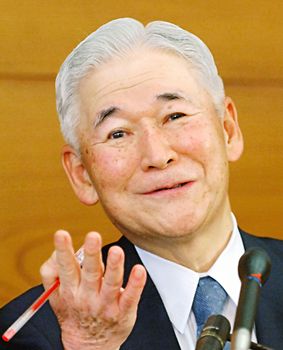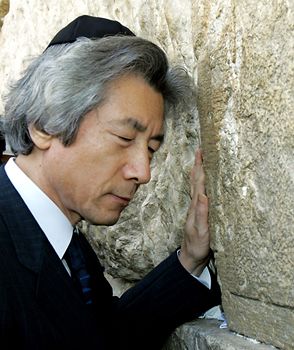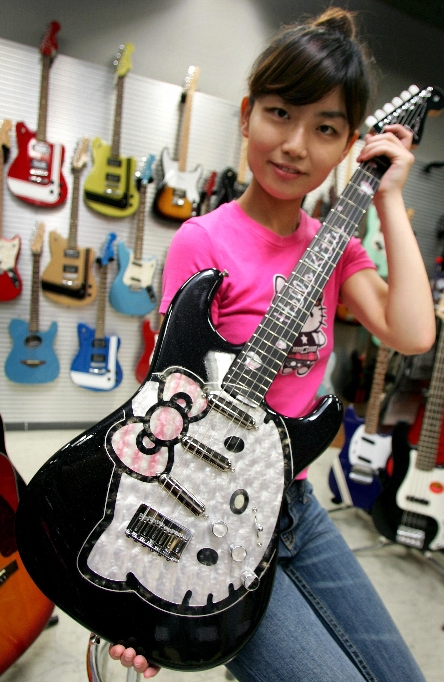Follow-up to my earlier post:

Category: Japan
The TV has claimed my life!
Some of you might be wondering where the hell I am most of the time. This conversation is illustrative:
Adamu: sup man
Joe: watching TV
Adamu: cweet
Joe: just saw ryoko hirosue score a penalty kick against a dog
Joe: then watched a guy get punk’d by another guy who dressed up as a panda
Normally, I hate TV, but there’s a lot of awesome stuff I’ve been watching lately:
- Sumo. Foreign rikishi were such a great move! Now we have guys like Roho, who looks at his opponents with a face that says “Listen, buddy, I eat glass and shit sand.” And good ol’ Asashoryu, who’s fond of guts poses and doesn’t make secret his contempt for kimchi.
- NHK’s Weeky News for Kids. The zero interest rate policy is so much more fun when you have a freaky cartoon character and a weirdo dressed in plaid trying to explain it.
- Commercials featuring Japanese-speaking foreigners.
- It’s damn funny to watch Shido Nakamura lamely explain that he was “only drinking oolong tea.”
Someday I’ll get in on the act with my own show, “Bengoshi no JOE!” Every Thursday night, I’ll decide a case along with my two co-judges, a random comedian/dietperson and a random “talent” with huge breasts.
Mr. Icky Raises Japan’s Interest Rate

BOJ Chief Toshihiko Fukui has raised Japan’s interest rates to 0.25%, ending a nearly 6-year period free or less than free money in Japan.
If you’ve spent any extended time in Japan then you have surely had an encounter with an Oyaji (or “ossan” depending on the circumstances). Chances are he looked something like this. You may have suspected that he at one time or another frequented one of Japan’s legalized prostitution hubs, but unlike Mr. Fukui here you had no proof that he liked his shabu shabu with no underwear. Nonetheless, the bad English, stinky breath, irrational claims of Japanese superiority, and general ickiness no doubt put you off.
Ladies and gentlemen, I present to you King of Oyaji. Behold, and fear for Japan’s future!
Awwwww, yeah
King Becomes Prime Minister’s Chauffeur
Aqaba, Jordan (AHN) — After King Abdullah of Jordan hosted a dinner in the city of Aqaba Thursday for visiting Japanese Prime Minister Junichiro Koizumi, he decided to chauffeur him Koizumi back to his hotel.
Koizumi stated, “I did not think the king himself would take me back to my hotel.”
After the king and prime minister talked for two hours over dinner, the king suddenly suggested that he drive Koizumi to his hotel in a Range Rover.
With the king behind the wheel, they arrived at Koizumi’s hotel in high spirits, joking in the Range Rover until Koizumi got out.
Thanks to fark.com
Koizumi Continues to Flout His Own Constitution!

Prime Minister Junichiro Koizumi respectfully places his hand on the Wailing Wall, one of Judaism’s most sacred sites, in Jerusalem on Thursday during a trip to the Middle East that takes him to Israel, the Palestinian territory and Jordan. (AP)
(From Nikkei)
Who will stop Koizumi from continuing these perverse, random acts of worship?!
I Pray for an End to Hello Kitty Merchandizing
Seriously, I am just so sick of this crap:

Are people still interested to see what else the Sanrio people can put Hello Kitty’s face on who else signs up to beat the dead horse that is licensed Sanrio merchandise? If so, get over it! Please! A Hello Kitty guitar simply does not deserve to be front page news these days (as of now it’s the top image at MDN). Last I checked, Hello Kitty merchandise was the Snakes on a Plane of 2 years ago. That is, it all of a sudden started appearing everywhere online, only to spark a quick backlash once it became overexposed.
History of Enka Part 1 of 2
“Enka” is a term referring to a particular genre of Japanese music. It is similar in spirit if not in style to US country music – in other words it sings about the traditional downhome values of Japan and beatifies the past to a certain extent. Here‘s an example of it on YouTube “The Red-bean Camelia is the Flower of Love”. Similar music is popular in most of Asia (including Vietnam, China, and North and South Korea).
What many people don’t know, however, is that enka was not always the music of the status quo (from Wikipedia):
History
Enka was originally a product of the Freedom and People’s Rights Movement. The songs were used as a way to put political statements and messages criticizing clan politics into song. In other words, they are songs that satired politics, and the word “enka” (literally “speech song”) is said to have had its roots the late 19th century when public speeches were harshly repressed, causing speeches to be replaced by singing songs. Even prior to that, there were songs that satired politics, but afterward the name “enka” stuck. However, as time passed the meaning of the word evolved and “enka” is no longer used to refer to songs including political content. From the latter part of the Meiji Era, enka singers came to sing socially satirical songs with emotional themes. In the Taisho era, some enka singers began to incorporate elements of Western music. This was the time of Shunyo Tottori‘s debut (listen to a cover/karaoke of Tottori “Caged Bird” here). His “Caged Bird” captivated a generation of Japanese. In the Showa era, foreign record labels opened operations in Japan, and a new era came to Japan in the form of the recording system. At that time Western-style performers came into fashion and enka gave up its top position in pop culture.
Sickeningly Insulting Info-tainment from the Daily Yomiuri
Consider these two phenomena:
1) Athletes endorsing products that supposedly help their performance; and
2) Exploitive marketing of second language learning products that offer a specific pattern of drills as a purported secret to learning the language.
By themselves, they are typical, if somewhat sleazy parts of everyday consumer life. But put them together and you get this nugget of infotainment from the ethically-challenged Daily Yomiuri:
Bobby Valentine learns the joy of Japanese
Yoko Mizui Daily Yomiuri Staff Writer
“The most exciting thing that ever happened to me was not winning the Asian Championship and the Japan Championship last year. Nor was it winning the Major League. It was not even winning koryusen this year,” said Chiba Lotte Marines baseball team manager Bobby Valentine. “The most exciting thing was that at the age of 50 plus, I could discover Step Up Nihongo and learn the language.”
Valentine talked about how he learned the Japanese language and utilizes it in managing his team at a seminar to introduce a new e-learning system, “eSUN,” in Tokyo on June 26.
Step Up Nihongo (SUN) is a set of textbooks for non-Japanese to study the Japanese language, written by Shigekatsu Yamauchi, who also writes the monthly column “Japanese in Depth” for the Language Connection page of The Daily Yomiuri.
That’s right, just when you think Chiba Marines manager Bobby Valentine is going to give us some insight into ups and downs of his attempts to learn the language of his adopted home (which he incidentally lives away from in the off-season), BAM you get a sales pitch. There is nothing indicating that this article is an advertisement meant to promote a specific product. And adding insult to injury, there’s next to no info about how good Valentine’s Japanese actually is or how he really learned it. I guess it’s up to us to try eSUN and find out, right?
In the interest of fairness, there are dozens of press releases put out and promotional events held every single day in Japan announcing the arrival of some great new product. Every one of them claims to be newsworthy, making it up to the reporter/editor’s judgment to know what is really worth printing. If we give the Yomiuri the benefit of the doubt, “Bobby Valentine endorses Japanese study method” could be newsworthy in and of itself. He’s yet another success story of a foreigner in Japan, so people want to hear just about any tidbit of information that’s available. I mean, color me ignorant, but I didn’t even know Valentine was seriously studying Japanese, although I’m not about to start believing it now (Question: is his Japanese any good? According to this Nov 2005 interview it’s “a major problem”). Unfortunately, the article is not exactly written to emphasize the newsworthy aspects of the event. Again and again the writer emphasizes the benefits of eSUN.
Keep in mind that in the Japanese media, product placement passed off as news (i.e.: with no mark denoting that you’re looking at an ad rather than actual news) is rampant (for example, Nikkei has an entire Saturday supplement for just such a purpose). Marxy has some good coverage of that phenomenon on his blog.
I would say this article fits snugly into that tradition of unannounced advertising. Especially since after about 10 minutes of the most cursory research, I was able to unearth a good bit of info to that makes it unlikely that Valentine is merely a volunteer supporter of this learning technique.
First let’s consider: are we really expected to believe that the discovery of this product was the most exciting moment ever in the life of the Bobby Valentine, the only foreign manager (except for Sadaharu Oh I guess but he doesn’t count) in Japanese baseball to ever win the Pacific League and Japan Series championships and, coincidentally, the inventor of the “wrap” sandwich?
If it is, he’s been quiet about it up to now – he only mentions the product once on his official blog (which in turn is a marketing gimmick for a different site) in the form of a brief non-sequitur in a February 2006 post explaining how the blog works:
It is very interesting to note that David, who is bilingual in English and Japanese, learned his Japanese from the same teacher I am currently learning mine! Our teacher is Shige Yamauchi-sensei of ICI, a foreign language school in Tokyo. Using Step Up Nihongo (SUN), which is a wonderful teaching tool for those that want to learn Japanese, students can not only learn it by book and tape form but also interactive internet lessons as well.
But that brief endorsement was enough to warrant ICI, creator of the Step Up method and the company featured in the article in question, to include a full-on graphic logo (linked to the above blog post) on their website to let potential students know that Valentine endorses their methods:

And I’m sure he does – but I have a tough time believing he’s doing this simply as an uncompensated advocate. The article claims that Valentine was hooked on eSUN after someone handed it to him on a plane. Sure, and James Bond drives a BMW to impress chicks. Valentine is a businessman. Look at the way he’s doing his blog: some secretary is recording his thoughts while he’s on the road, and then transcribing them onto a blog that links directly to a major Valentine investment. Pretty shrewd!
And from the get-go, the seminar that constitutes the “where” of the article was held by a company run by a Yomiuri contributor. Considering that the very existence of his column is a convenient way to drum up business, sneaking in a cheap promotion of a celebrity endorsement of his product doesn’t make for much of an intellectual stretch. And being a part of the Yomiuri establishment must make it easy to cut in line ahead of other, less-connected Japanese learning methods.
So we’ve got a) An article that is clearly pushing a specific product but does not identify itself as an ad; b) a subject who in all likelihood is a paid (but unannounced) spokesman for the product; and c) The company offering said product has personal and financial connections to Yomiuri. In my own amateur opinion, such an article violates the “newspaper ethics” that the Yomiuri supposedly subscribes to as a member of the Japan Newspaper Publishers and Editors Association (NSK). Here’s the relevant excerpt of the NSK’s Journalistic Canon, Newspaper Advertising Printing Standards (for some reason these standards are left out of the English version of the NSK website):
[Newspapers] shall not print advertisements that correspond to the following:
[omitted]
3. Falsehoods or items for which there is a danger of misinterpretation.
“Items for which there is a danger of misinterpretation” refers to the following:
(1) [Advertisements] that use formatting and expressions that look ambiguously like editorial matter, making the fact that it is an advertisement unclear.
[rest omitted]
So as long as the journalistic canon applies to online articles (at least it seems to in the US) the DY might consider sticking the word “advertisement” above articles that serve little purpose than to sell us something. Until either that happens or I get definitive proof that Bobby Valentine has no endorsement deal with Step Up Nihongo, I will continue to be properly offended.
(Thanks to FG for pointing this article out to me)
Asian History Carnival #5
The latest installment of the Asian History Carnival is up, this time being hosted at the World History Blog. As always, there are a number of great links to pieces by various authors on a far greater range of topics than you would ever find on, say, this humble blog. Speaking of which, there are cited no less than three different posts on this blog. Want to know which ones? Go see for yourself!
Man Convicted of Indecency Promises not to do it Again, Approaches the Same Victims the Very Next Day
Yukan Fuji learned on July 6 that a judge at the Sendai High Court ordered a man (66) of Kesennuma City, Miyagi Prefecture, to stop following 6 young girls and their parents and pay damages in a lawsuit against him brought by the parents of girl victims alleging that the man followed 3 girls the next day after receiving a guilty verdict for touching the same girls.
According to the July 4 appeal decision, the man was arrested in April 2005 for forced indecency for touching the bodies of 3 elementary school-aged girls, and in June the Sendai Regional Court sentenced the man to 2 years 6 months suspended for 5 years.
The man was released after promising in court that he would “no talk to them or anything anymore”, but he talked to 2 of the 3 girls the next day after the verdict and repeatedly followed the girls for 2.5 months.
The parents sued the man, demanding he cease following the girls and pay 6.6 million yen on allegations that “mental scars remain in our daughters that will last a lifetime.” In March 2006 the Sendai regional court fully accepted the accusations, ordering the man not to take any action that would cause grief to the girls or their parents, and the Sendai high court followed suit, ordering him to pay 5.1 million yen.
The man appealed, denying that he followed the girls.
ZAKZAK 2006/07/06
